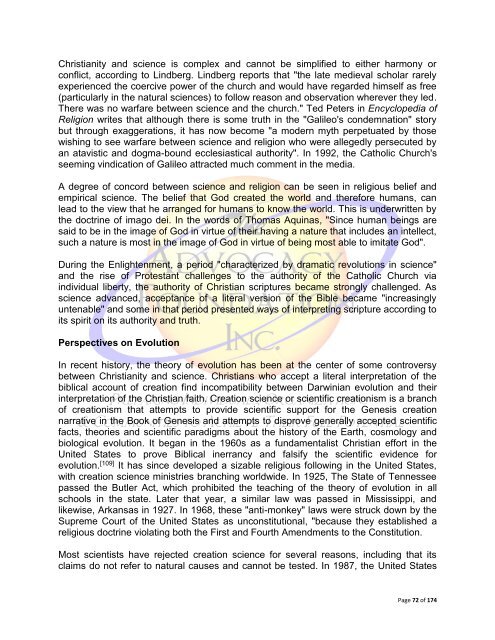The Gift of Spirituality
The Gift of Spirituality
The Gift of Spirituality
Create successful ePaper yourself
Turn your PDF publications into a flip-book with our unique Google optimized e-Paper software.
Christianity and science is complex and cannot be simplified to either harmony or<br />
conflict, according to Lindberg. Lindberg reports that "the late medieval scholar rarely<br />
experienced the coercive power <strong>of</strong> the church and would have regarded himself as free<br />
(particularly in the natural sciences) to follow reason and observation wherever they led.<br />
<strong>The</strong>re was no warfare between science and the church." Ted Peters in Encyclopedia <strong>of</strong><br />
Religion writes that although there is some truth in the "Galileo's condemnation" story<br />
but through exaggerations, it has now become "a modern myth perpetuated by those<br />
wishing to see warfare between science and religion who were allegedly persecuted by<br />
an atavistic and dogma-bound ecclesiastical authority". In 1992, the Catholic Church's<br />
seeming vindication <strong>of</strong> Galileo attracted much comment in the media.<br />
A degree <strong>of</strong> concord between science and religion can be seen in religious belief and<br />
empirical science. <strong>The</strong> belief that God created the world and therefore humans, can<br />
lead to the view that he arranged for humans to know the world. This is underwritten by<br />
the doctrine <strong>of</strong> imago dei. In the words <strong>of</strong> Thomas Aquinas, "Since human beings are<br />
said to be in the image <strong>of</strong> God in virtue <strong>of</strong> their having a nature that includes an intellect,<br />
such a nature is most in the image <strong>of</strong> God in virtue <strong>of</strong> being most able to imitate God".<br />
During the Enlightenment, a period "characterized by dramatic revolutions in science"<br />
and the rise <strong>of</strong> Protestant challenges to the authority <strong>of</strong> the Catholic Church via<br />
individual liberty, the authority <strong>of</strong> Christian scriptures became strongly challenged. As<br />
science advanced, acceptance <strong>of</strong> a literal version <strong>of</strong> the Bible became "increasingly<br />
untenable" and some in that period presented ways <strong>of</strong> interpreting scripture according to<br />
its spirit on its authority and truth.<br />
Perspectives on Evolution<br />
In recent history, the theory <strong>of</strong> evolution has been at the center <strong>of</strong> some controversy<br />
between Christianity and science. Christians who accept a literal interpretation <strong>of</strong> the<br />
biblical account <strong>of</strong> creation find incompatibility between Darwinian evolution and their<br />
interpretation <strong>of</strong> the Christian faith. Creation science or scientific creationism is a branch<br />
<strong>of</strong> creationism that attempts to provide scientific support for the Genesis creation<br />
narrative in the Book <strong>of</strong> Genesis and attempts to disprove generally accepted scientific<br />
facts, theories and scientific paradigms about the history <strong>of</strong> the Earth, cosmology and<br />
biological evolution. It began in the 1960s as a fundamentalist Christian effort in the<br />
United States to prove Biblical inerrancy and falsify the scientific evidence for<br />
evolution. [109] It has since developed a sizable religious following in the United States,<br />
with creation science ministries branching worldwide. In 1925, <strong>The</strong> State <strong>of</strong> Tennessee<br />
passed the Butler Act, which prohibited the teaching <strong>of</strong> the theory <strong>of</strong> evolution in all<br />
schools in the state. Later that year, a similar law was passed in Mississippi, and<br />
likewise, Arkansas in 1927. In 1968, these "anti-monkey" laws were struck down by the<br />
Supreme Court <strong>of</strong> the United States as unconstitutional, "because they established a<br />
religious doctrine violating both the First and Fourth Amendments to the Constitution.<br />
Most scientists have rejected creation science for several reasons, including that its<br />
claims do not refer to natural causes and cannot be tested. In 1987, the United States<br />
Page 72 <strong>of</strong> 174

















